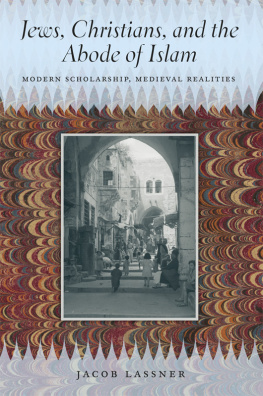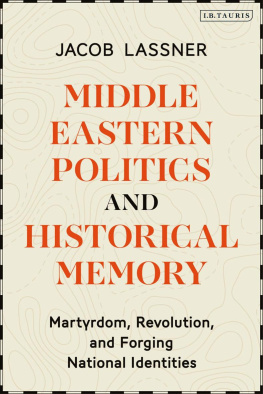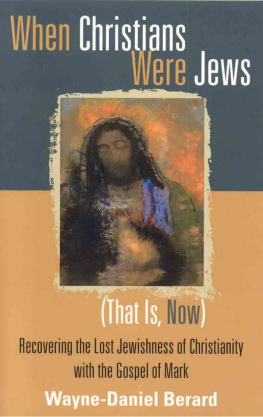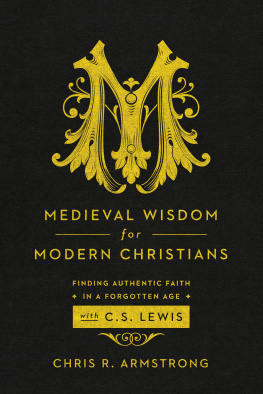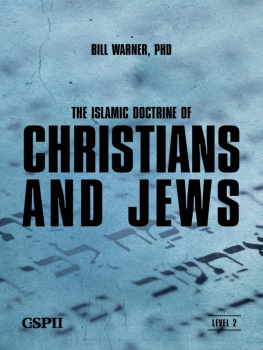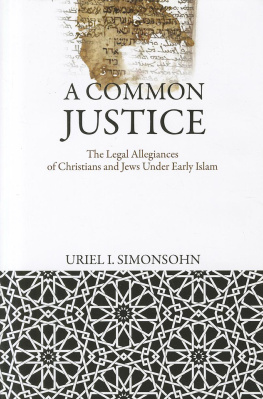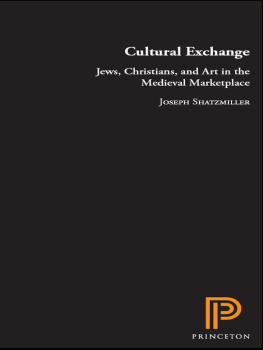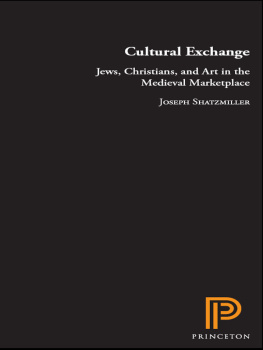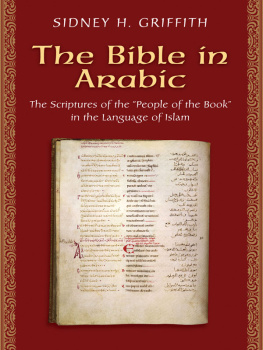Lassner - Jews, Christians, and the Abode of Islam: Modern Scholarship, Medieval Realities
Here you can read online Lassner - Jews, Christians, and the Abode of Islam: Modern Scholarship, Medieval Realities full text of the book (entire story) in english for free. Download pdf and epub, get meaning, cover and reviews about this ebook. year: 2012, publisher: Chicago Press, genre: Religion. Description of the work, (preface) as well as reviews are available. Best literature library LitArk.com created for fans of good reading and offers a wide selection of genres:
Romance novel
Science fiction
Adventure
Detective
Science
History
Home and family
Prose
Art
Politics
Computer
Non-fiction
Religion
Business
Children
Humor
Choose a favorite category and find really read worthwhile books. Enjoy immersion in the world of imagination, feel the emotions of the characters or learn something new for yourself, make an fascinating discovery.
Jews, Christians, and the Abode of Islam: Modern Scholarship, Medieval Realities: summary, description and annotation
We offer to read an annotation, description, summary or preface (depends on what the author of the book "Jews, Christians, and the Abode of Islam: Modern Scholarship, Medieval Realities" wrote himself). If you haven't found the necessary information about the book — write in the comments, we will try to find it.
Lassner: author's other books
Who wrote Jews, Christians, and the Abode of Islam: Modern Scholarship, Medieval Realities? Find out the surname, the name of the author of the book and a list of all author's works by series.
Jews, Christians, and the Abode of Islam: Modern Scholarship, Medieval Realities — read online for free the complete book (whole text) full work
Below is the text of the book, divided by pages. System saving the place of the last page read, allows you to conveniently read the book "Jews, Christians, and the Abode of Islam: Modern Scholarship, Medieval Realities" online for free, without having to search again every time where you left off. Put a bookmark, and you can go to the page where you finished reading at any time.
Font size:
Interval:
Bookmark:
JEWS, CHRISTIANS, AND THE ABODE OF ISLAM
Modern Scholarship, Medieval Realities
Jacob Lassner

The University of Chicago Press
Chicago & London
JACOB LASSNER is the Philip M. and Ethel Klutznick Professor Emeritus of Jewish Civilization and professor of history and religion at Northwestern University.
The University of Chicago Press, Chicago 60637
The University of Chicago Press, Ltd., London
2012 by The University of Chicago
All rights reserved. Published 2012.
Printed in the United States of America
| 21 20 19 18 17 16 15 14 13 12 | 1 2 3 4 5 |
ISBN- 13: 978-0-226-47107-5 (cloth)
ISBN- 10: 0-226-47107-1 (cloth)
ISBN- 13: 978-0-226-47109-9 (e-book)
Library of Congress Cataloging-in-Publication Data
Lassner, Jacob.
Jews, Christians, and the abode of Islam : modern scholarship, medieval realities /
Jacob Lassner.
p. cm.
Includes bibliographical references and index.
ISBN-13: 978-0-226-47107-5 (cloth : alkaline paper)
ISBN-10: 0-226-47107-1 (cloth : alkaline paper) 1. Islamic EmpireEthnic relationsReligious aspects. 2. JewsIslamic EmpireHistory. 3. IslamRelationsJudaism. 4. JudaismRelationsIslam. 5. IslamRelationsChristianity. 6. Christianity and other religionsIslam. 7. Civilization, MedievalReligious aspects. 8. OrientalismHistory. 9. Islamic learning and scholarshipHistory. 10. East and West. I. Title.
BP171.L37 2012
297.2820902dc23
2011032939
 This paper meets the requirements of ANSI/NISO Z39.48-1992 (Permanence of Paper).
This paper meets the requirements of ANSI/NISO Z39.48-1992 (Permanence of Paper).
Contents
Preface
T his book examines the triangular relationship that defined and continues to define political and cultural interaction among the so-called Abrahamic faiths. As such, the story told in the pages that follow reflects both medieval realities and a modern scholarship, which shapes our understanding of the medieval milieu. At issue is how Jews, Christians, and Muslims perceived and accommodated one anothers society and culture as Islamic civilization took shape, beginning in the seventh century CE, and how the intellectual encounter between the modern West and traditional Muslims has led to divergent and often highly contentious understandings of a shared monotheist past. Hence, the subtitle: Modern Scholarship and Medieval Realities.
The audience for this book includes specialists in Near Eastern history; other Islamicists; scholars of Medieval Europe; and colleagues in various disciplines of the humanities and social sciences. Above all, this work was written for intellectually curious readers outside the academy, the kinds of individuals who, given the current state of world affairs, desire to know more of the Islamic Near East without being exposed to polemics and overly tendentious analysis. With this broad readership in mind, I have embarked on a project that will meet the scholarly standards of experts in Near Eastern studies while at the same time being accessible to more general readers. As always, economic constraints dictate the size of a book. After much soul searching, I decided to forego compiling the hundreds of dense footnotes or endnotes that a number of specialists would have desired but that a broader reading public would find largely superfluous. I trust that readers familiar with my previous publications will have faith in my ability to navigate through the secondary literature and the difficult primary sources that serve as the scaffolding for the extended narrative that follows.
O ne could say that, in many respects, this book is modestly conceived. It is not meant to be a comprehensive account of how interfaith relations in the medieval Near East were defined by law and social convention. Nor does it attempt to portray in full detail the actual condition of Jews and Christians living under Islamic rule. No single work on either of these two far-reaching subjects, let alone both combined, is actually doable, not by a solitary scholar, and probably not by several scholars working in tandem. The enormous learning required for examining the triangular relationship among the Abrahamic faiths and, more particularly, the lack of proper textual and material evidence for large periods and many regions of the medieval Islamic world can lead, at best, to an unbalanced picture. Put somewhat differently, modern historians attempting to recover the interrelated world of Jews, Christians, and Muslims may be seduced into regarding particular moments and historical venues as indicative of a universal condition. The preference here is for cautious claims and tentative conclusions. In the chapters below, readers are alerted, again and again, to the highly fragile evidence at our disposal and the manner in which it is used to interpret events of different times and historic sites.
Seeking a proper format that avoids the pitfalls of history writ large, I have chosen a series of closely linked and reflective essays. Read together, these essays are designed to draw attention to interactions between medieval Jews, Christians, and Muslims, monotheists who embraced a common sacred history that broadly reflects what may be described for lack of a better term as the biblical milieu. As accounts of biblical persons and themes were marked by conflicting narratives in Jewish, Christian, and Muslim traditions, they became the subject of contested interpretation. Mutual appreciation gave way to expressions of mutual antagonism, and the closely linked Jewish, Christian, and Muslim traditions encouraged feelings of suspicion and defensiveness. From the very outset of Islam, the embrace of similar and yet different monotheist concepts and religious practices, and the interlocking patterns of settlement that brought the descendants of Abraham into close daily contact, created competition among them for sacred space. That competition was perceived as a real and present danger for believers seeking to preserve their traditional way of life. Situated in the same watan or homeland, medieval Jews, Christians, and Muslims were well aware of the need to guard against external religious influences that might weaken their resolve and/or cause them to stray, if only inadvertently, from paths outlined by the official guardians of their faiths. In the worst scenario, there was the danger of apostasy, a worry more common among the formerly dominant Christians than the politically impotent Jews. Although forced conversion to Islam was rare, the psychic and economic advantages of embracing a Muslim faith not so dissimilar from ones own were self-evident. For many Christians, the vast and rapid Muslim conquest was a sign that God had transferred his favor to Muhammads community. For Jews, the strict monotheism of the Muslims and the similarities between Jewish and Muslim practices might have served as an inducement for the faint hearted or opportunistic to opt in favor of conversion. Muslims were not so troubled by conversion to the older monotheistic faithsan offense punishable by death. But diluting an authentic Islam by allowing the faithful to adopt seductive Jewish and Christian beliefs and practices was seen as a challenge by the more dour religious authorities. Each of the monotheist communities had to address problems presented by the very presence of the others.
When examined closely, the medieval literature contra Islam is largely defensive, more reflective of apologia than formal polemics against the Muslims and their faith. Christian apologetic tracts are often written in Syriac; Jews wrote in Hebrew and Judeo-Arabic, languages unfamiliar to virtually all Muslims and written in scripts that Arab Muslims could not decipher. Moreover, these writings are sprinkled with skillfully craft ed and deliberately vague allusions to ancient Jewish and Christian sources. The use of this circumspectand, to Muslims, highly elusive if not inaccessiblelanguage was intentional. Its purpose was to prevent defection within the Jewish and Christian communities to whom these texts were addressed without risking antagonistic responses from the ruling Muslim authorities. While the Muslim literature about Jews and Christians employs many of the same rhetorical strategies and linguistic flourishes, it tends as a rule to reflect a greater degree of self-confidence, as one might expect from a religious community that enjoyed the full backing of the state and, until modern times, withstood the challenge of all external forces. In sum, Muslim writings about Jews and Christians tend to be less apologetic and more forcefully polemical in nature. It is reasonable to assume that the intended audience for these polemical missives consisted not only of Muslims but also of learned Jews and Christians, as well as recent converts from those faiths. As many Jews and Christians were familiar with literary Arabic, they would have had little if any difficulty ferreting out the Muslim arguments on behalf of Muhammad and Islam. Needless to say, Jews and Christians remaining loyal to their faiths would have been inclined to resist Muslim claims and respond accordingly. Hence, the cycle of polemics and apologetics was ongoing while, in daily life, the Abrahamic peoples found ways to accommodate each others presence.
Next pageFont size:
Interval:
Bookmark:
Similar books «Jews, Christians, and the Abode of Islam: Modern Scholarship, Medieval Realities»
Look at similar books to Jews, Christians, and the Abode of Islam: Modern Scholarship, Medieval Realities. We have selected literature similar in name and meaning in the hope of providing readers with more options to find new, interesting, not yet read works.
Discussion, reviews of the book Jews, Christians, and the Abode of Islam: Modern Scholarship, Medieval Realities and just readers' own opinions. Leave your comments, write what you think about the work, its meaning or the main characters. Specify what exactly you liked and what you didn't like, and why you think so.

